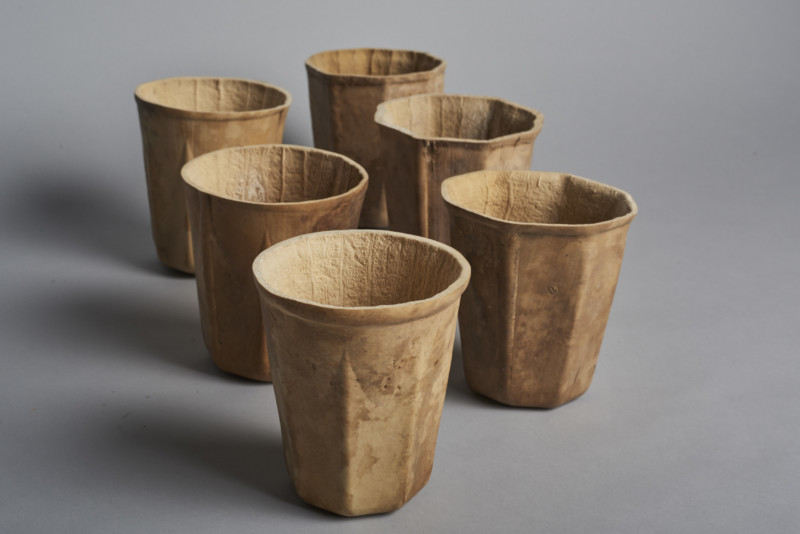Quand des courges deviennent des gobelets

Crème Design, un cabinet de design basé à New York (États-Unis), a imaginé des gobelets et des bouteilles 100% biodégradables et compostables. Leur particularité : ils ont été créés à partir… de courges !
Ce n’est pas le scoop de l’année : les gobelets dans lesquels on aime boire notre cappuccino, latte ou expresso sont néfastes pour l’environnement. Ceux proposés dans les enseignes comme Starbucks sont certes en carton, mais la plupart sont recouverts d’un film plastique à l’intérieur. Ce qui rend le recyclage très compliqué. Au Royaume-Uni, une tasse sur 400, soit 0,25%, serait recyclée. Les autres gobelets atterriraient à la poubelle et seraient ainsi incinérés ou enfouis dans des décharges à ciel ouvert. Sympa pour la planète. Et ce n’est qu’un exemple. Imaginez aux États-Unis, pays où le gobelet jetable est roi. Conscient de cette problématique, le cabinet de design Crème Design s’est alors creusé les méninges pour trouver une alternative plus « verte » aux tasses traditionnelles. Son idée ? Créer des gobelets à partir de légumes. Oui, oui !
La technique du moulage
Concrètement, les tasses de Crème Design sont conçues à partir de courges qui ont été moulées, vidées et séchées. Le studio a confectionné des moules grâce à une imprimante 3D. Dans ces derniers, des jeunes cucurbitacées ont été placés afin qu’ils prennent, lors de leur croissance, la forme du moule. Les courges ont ensuite été vidées et séchées. Et hop, ça donne des Chocapic gobelets végétaux et compostables, mais aussi des bouteilles. Selon les concepteurs, les contenants seraient parfaitement étanches. Génial non ? Cette technique n’est d’ailleurs pas nouvelle, comme l’explique Crème Design sur son site : « Nos ancêtres utilisaient traditionnellement les courges séchées comme tasses ou autres réceptacles. Crème a exploré cet artisanat séculaire en utilisant des moules pour développer des contenants ayant des formes fonctionnelles telles que des tasses et des flacons pour créer des produits durables, renouvelables et compostables sans déchets. »
Alors, prêt.e.s à boire votre latte ou café dans une courge ?
Voir cette publication sur Instagram






Pills prescribing information. Generic Name. fluoxetine body temperature Some about medication. Read information now.
amoxil cost – buy valsartan 160mg pills ipratropium 100 mcg over the counter
Welcome to the world of Sharia-compliant finance where morally guided finance meets modern economic principles. In this article we will unpack the basics of Islamic finance showcase its merits and inform you on steps to take. Whether you’re a seasoned investor or just curious this overview will deliver you valuable insights. What is Islamic Finance? Islamic finance is a financial system that follows Sharia principles. It disallows usury promotes risk-sharing and focuses on value-driven projects. Unlike conventional finance Islamic finance is rooted in social responsibility. Key Principles of Islamic Finance Prohibition of Riba Interest: Gaining interest is strictly forbidden in Islamic finance. Risk-Sharing: Financial agreements should involve mutual responsibility. халяльные акции Asset-Backed Investments: Investments must be linked with real assets. Prohibition of Haram Activities: Funding businesses that are associated with alcohol gambling or other prohibited sectors is not permissible. Popular Islamic Financial Instruments Sukuk Islamic Bonds: A trusted instrument for investment in Islamic finance. Mudarabah Profit-Sharing: A business arrangement where one party provides funds and the other offers expertise. Musharakah Joint Venture: A joint partnership model. Istisna: A mechanism for project financing. Halal ETFs and Mutual Funds: Faith-based funds targeting diverse portfolios. Why Choose Islamic Finance? Ethical Foundations: Trust a system based on ethics. Risk Mitigation: Benefit from shared risks and fair returns. Diverse Opportunities: Access a rich Sharia-compliant investments from halal stocks to Sukuk. Transparency: Islamic finance ensures openness in financial dealings. Halal Investment Options Sharia-compliant banking Halal Stocks: Invest in companies that adhere to Islamic principles. Real Estate: A reliable and Sharia-compliant option. Sukuk: Choose ethical bonds with stable returns. Digital Assets: Explore halal cryptocurrency and blockchain markets. Islamic Mutual Funds: Grow your portfolio with faith-based funds. How to Start Investing in Islamic Finance Educate Yourself: Understand the principles of Islamic finance. Choose a Halal Investment Platform: Use a reliable app or platform that specializes in halal trading. Consult an Islamic Financial Advisor: Seek guidance from qualified professionals. Review Investment Options: Analyze available halal investment opportunities. Start Small: Begin with minimal investments to understand the market. Challenges and Misconceptions Limited Awareness: Many investors are unaware of Islamic finance. Access to Information: Finding trusted resources can be difficult. Misinterpretations: Some misunderstand Sharia-compliant rules. Geographical Constraints: Not all regions have accessible platforms. Overcoming Barriers Raise awareness about Islamic finance through outreach. Develop innovative apps and tools. Encourage international partnerships. Strengthen regulations to facilitate Sharia-compliant systems. Sharia banking Future of Islamic Finance The rise of Islamic finance is notable. With increasing demand it is likely to thrive further. From halal ETFs to Sharia-compliant blockchain the future is exciting. Call to Action Are you ready to explore the world of Sharia-compliant opportunities? Start your investment today with trusted resources. Unlock a world of moral finance.